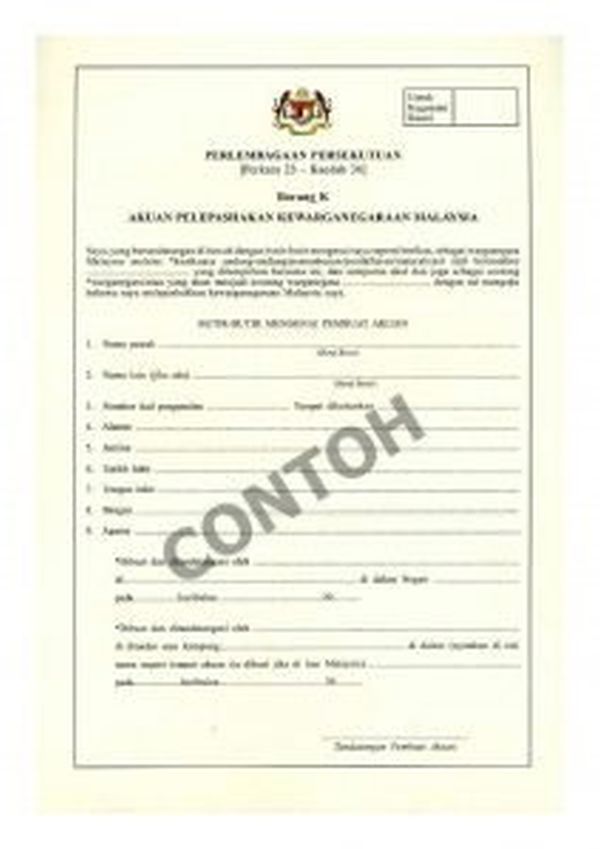Article 24 of the Federal Constitution of Malaysia ("Constitution") states that any citizen who has acquired citizenship of another country may be deprived of Malaysian citizenship. This is perhaps the reason for the general understanding that Malaysians are not allowed to have dual citizenship. But what happens then to individuals who obtain foreign citizenship in addition to their Malaysian citizenship? This article addresses several frequently asked questions on dual citizenship and the deprivation of citizenship within the context of Article 24 of the Constitution.
1. Who has the power to deprive me of my citizenship?
The power to deprive a citizen of citizenship lies with the Federal Government. The power does not lie with government agencies such as the National Registration Department or Immigration Department. Under Article 24 of the Constitution, the Government has the discretion to deprive a person of his citizenship if the Government is satisfied that the individual has voluntarily acquired citizenship of any country outside Malaysia.
Article 24 of the Constitution
Deprivation of citizenship on acquisition or exercise of foreign citizenship
(1) If the Federal Government is satisfied that any citizen has acquired by registration, naturalization or other voluntary and formal act (other than marriage) the citizenship of any country outside the Federation, the Federal Government may by order deprive that person of his citizenship.
(2) If the Federal Government is satisfied that any citizen has voluntarily claimed and exercised in any country outside the Federation any rights available to him under the law of that country, being rights accorded exclusively to its citizens, the Federal Government may by order deprive that person of his citizenship. ...
If a person holding Malaysian citizenship is found to be using a foreign passport, he will be deemed to have voluntarily claimed and exercised a right which is accorded exclusively to the citizens of the foreign country. This will be good reason for the Government to exercise its discretion to deprive the person of his Malaysian citizenship.
Such power to deprive a person of his citizenship under Article 24 of the Constitution can only be validly undertaken by the Government, as stated by the Court of Appeal in The Speaker of Dewan Undangan Negeri of Sarawak Datuk Amar Mohamad Asfia Awang Nassar v Ting Tiong Choon & Ors and other appeals [2018] 12 MLJ 176:
"... As mentioned by the learned judge, while Malaysia does not recognise dual citizenship, any deprivation of citizenship may only be validly undertaken by the Federal Government pursuant to arts 24 and 27 of the Federal Constitution, or if it was voluntarily renounced by the plaintiff himself under art 23 of the Federal Constitution. Until to date, there is no evidence or indication to this effect ..."
2. Am I automatically deprived of my Malaysian citizenship if I acquire citizenship of another country?
A common misconception about holding dual citizenship in Malaysia is that once a Malaysian accepts foreign citizenship, he is automatically deprived of his Malaysian citizenship. This is inaccurate as the process for deprivation of citizenship does not happen automatically. There is, in fact, a set of procedures under Article 27 of the Constitution which must be followed by the Government prior to depriving a person of his citizenship.
Article 27 of the Constitution states that:
(a) Prior to making a deprivation order under Articles 24, 25 or 26 of the Constitution, the Federal Government shall issue a written notice to the said person;
(b) The said person shall be informed of (i) the grounds on which the deprivation order is proposed to be made; and (ii) his right to have the case referred to a committee of inquiry;
(c) A committee of inquiry shall be set up wherein the committee will comprise of a chairman (being a person possessing judicial experience) and two other members appointed by the Federal Government;
(d) An inquiry shall be held by the committee and a report shall be submitted to the Federal Government; and
(e) The Federal Government shall have regard to the committee's report in determining whether to make the said deprivation order.
In 2019, the New Straits Times reported that according to Tan Sri Muhyiddin Yassin, who was then the Home Minister, anyone can lodge a report with the National Registration Department on individuals holding dual citizenships. However, it was further stressed by Tan Sri Muhyiddin Yassin that "investigations cannot be done based on allegations" and that the "stripping of citizenship of those who possess double citizenships cannot be done" without relevant proof. In other words, there must be sufficient evidence against the individual before the Government may exercise its discretion to deprive him of his citizenship.
3. I was born outside of Malaysia to a Malaysian citizen. I have foreign citizenship by virtue of my birth in a foreign country. Can the Malaysian government deny my right to Malaysian citizenship on the basis that I am not allowed to hold dual citizenship?
A person's foreign citizenship is irrelevant to the recognition of his or her right to Malaysian citizenship by operation of law. The courts in various cases have held that a person's foreign citizenship is irrelevant to the question of whether a person is entitled Malaysian citizenship by operation of law.
In Haja Mohideen MK Abdul Rahman & Ors v Menteri Dalam Negeri & Ors [2007] 6 CLJ 662, senior federal counsel advanced the argument that the plaintiffs should not be recognised as Malaysian citizens on the basis that they were Indian citizens and that Malaysia does not recognize dual citizenship. The High Court in rejecting the argument, clarified and held that such issues are "quite irrelevant" to citizenship by operation of law under Article 14 of the Constitution. However, the High Court highlighted that this element may be relevant in an application for citizenship by registration under Article 15 of the Constitution.
In Samuel Duraisingh & Anor v Pendaftar Besar Kelahiran dan Kematian, Malaysia and another case [2019] 1 LNS 1474, the High Court held that the acquisition of foreign citizenship is not relevant when determining whether the children are entitled to citizenship by operation of law. The facts that the children had acquired British citizenship and that the Federal Government may deprive any citizen of its citizenship under Article 24 of the Constitution were irrelevant.
A similar position was also taken in Kalwant Kaur a/p Rattan Singh v Kementerian Dalam Negeri Malaysia & Anor [1993] 2 CLJ 648 wherein the High Court held that the question of deprivation of citizenship did not arise at that moment because the plaintiff's status as a Federal citizen was still unascertained.
In our respectful view, the Court of Appeal made an error on this point in the recent case of Chan Tai Ern Bermillo & Anor v Ketua Pengarah Pendaftaran Negara, Malaysia & Ors [2020] MLJU 215. Here, the child was born in the Philippines to a Malaysian father and a Filipino mother. At the time of the child's birth, the parents were not legally married. The Court of Appeal held that because the child was illegitimate, the child's citizenship is deemed to follow his mother's Filipino citizenship. The Court of Appeal further took the position that because the child is a citizen of the Republic of the Philippines and holds a Philippines passport, the child is deprived of his right to Malaysian citizenship under Article 24 of the Constitution.
As discussed above, the consideration by the Court of Appeal of Article 24 of the Constitution was premature as the question as to whether or not the child is entitled to Malaysian citizenship by operation of law had yet to be answered. Further, the power to deprive the child of his Malaysian citizenship on the basis that he holds Filipino citizenship belongs to the Federal Government, and not to the Judiciary. It is important to remember Malaysian citizenship by operation of law under Article 14 of the Constitution is different from citizenship by registration under Article 15(2) or Article 15A of the Constitution. (Click here to read more on citizenship by operation of law)
4. I am now married to a non-Malaysian and wish to relinquish my Malaysian citizenship in order to be registered as a citizen of another country. Can this be done?
Every Malaysian citizen has the right to renounce his or her citizenship, as provided for under Article 23 of the Constitution. In 2017, The Star reported that according to an official from the National Registration Department there were approximately 5,000 people who renounced their Malaysian citizenship annually.
Pursuant to Article 23 of the Constitution, a person who is of or over the age of twenty-one years and of sound mind may renounce his citizenship if he is a citizen of another country, or is about to become a citizen of another country. The person shall then submit a declaration to the Federal Government via a Form K (see picture below) and other supporting documents such as passport, birth certificate and foreign citizenship certificate or copy of confirmation that the applicant will become the citizen of a foreign country.

Form K – Declaration of Renunciation of Citizenship of Malaysia
(Akuan Pelepashakan Kewarganegaraan Malaysia)
Once the renunciation is registered by the Registrar-General of Citizenship, the person shall be required to surrender his national registration identity card and/or passport to the Registrar-General of Citizenship and by virtue of that, he will cease to be a citizen of Malaysia (see Andrew s/o Thamboosamy v Superintendent of Pudu Prisons, Kuala Lumpur [1976] 2 MLJ 156).
If the applicant who wishes to renounce her citizenship is a married woman, in addition to the Form K, the applicant will also need to submit her marriage certificate as a supporting document.
In the event a person who has renounced their Malaysian citizenship decides to change his or her mind, the National Registration Department website states that he or she will have to apply to the Federal Government under Article 18(2) of the Constitution before he can be reinstated as Malaysian citizen.
Originally published 23 June, 2020
The content of this article is intended to provide a general guide to the subject matter. Specialist advice should be sought about your specific circumstances.

